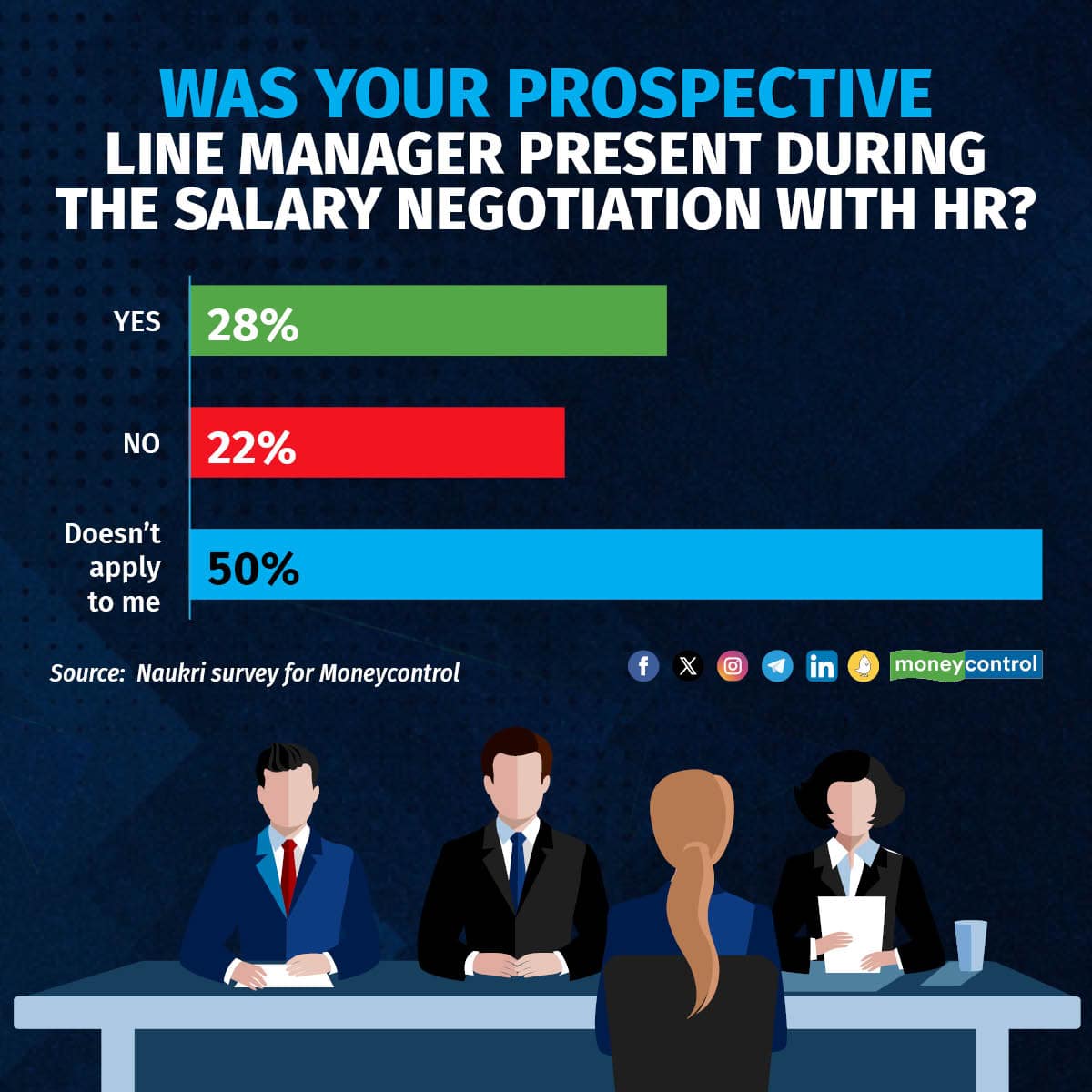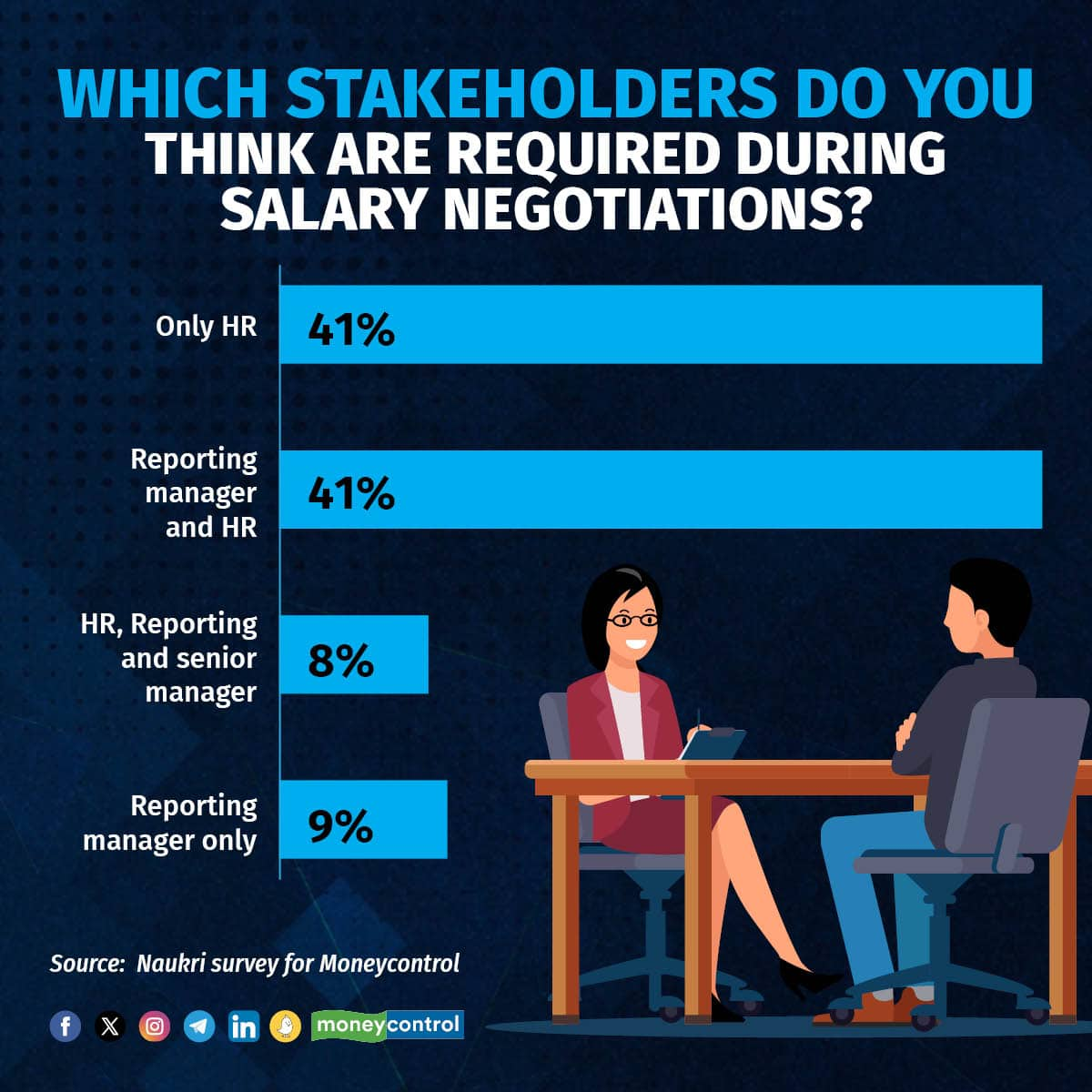



Candidates looking for jobs are split over who should be present during their salary negotiations, with 41 percent in a survey saying it should be only the HR team and another 41 percent saying both HR and their prospective reporting managers should attend.
Only 28 percent of candidates said their prospective line managers were present during salary negotiations, according to an exclusive survey for Moneycontrol conducted by job portal Naukri.
When asked who should be present, 41 percent said the reporting manager should be there along with a human resources representative. An equal percentage in the survey of over 32,000 candidates said they wanted only HR to attend. The survey was carried out in October.
A typical salary negotiation involves the job applicant and an HR representative. The process often begins after an assessment or interview by the prospective manager and the applicant receives a job offer.
Salary numbers are discussed with the HR team, which then consults with the manager, and the negotiations continue until an agreement is reached. This process is aimed at ensuring fair compensation while meeting the needs of the employer and the employee.
ALSO READ | Demand for 5 IT job roles drops by 35% amid automation, rising cloud-based solutions

However, an equal proportion of candidates said having only HR at the negotiation table is fair.
“HR only examines expectations and sees if it lies within the market benchmark or the company’s financial bracket. But prospective managers can understand the technicality of my job role and gauge the potential by matching my expectations with the promise I am making,” said Udaipur-based architect Siddharth Hingar.
Benefit of having manager + HR
The prospective manager brings firsthand knowledge of the role, its responsibilities and the value the candidate brings to the team. They can provide insights into the budget, internal equity and the organisation's compensation philosophy. Additionally, the manager's presence allows for a more comprehensive understanding of the candidate's qualifications and potential fit within the team.
The HR representative ensures adherence to company policies, legal considerations and fairness in compensation practices. Their expertise in compensation and benefits can help guide the negotiation process, ensuring a balanced outcome that aligns with both the candidate's expectations and organisational constraints.

But if employees want their prospective managers to be present, do they have a choice?
Indranil Choudhury, president and head of HR at UTI Asset Management Co., said it depends on the organisation and its hiring and selection policy, which can vary widely.
“HR and line managers together can create a high impact in the recruitment process. As HR already has the understanding of personality and individual characteristics, this can help line managers to focus more on the technical competency of the candidate,” Choudhury said.
Scope for more?
While having a prospective manager and an HR representative present during salary negotiations can be advantageous, it can also have disadvantages. One potential drawback is that the manager might create a power imbalance and his/her personal bias or limited understanding of market rates could result in a less competitive offer.
ALSO READ | HR experts warn of 'coffee badging' as employees return to offices
Furthermore, the HR representative's focus on company policies and budget constraints may prioritise organisational interests over the candidate's needs. This could potentially limit flexibility in the negotiations and hinder the candidate's ability to achieve the desired compensation package.
But to ensure a power balance and transparency, can there be a senior representative of the company along with the two?
According to Vandana S Ahuja, ED of HR consultancy firm Metamorph Dynamics Consulting, this is a strategic decision, depending on the level of the position being filled.
“For senior-level roles, involving a senior executive makes sense because of not only the high salary figures involved but also to ensure alignment for risk mitigation in senior, critical positions,” she said.
However, when dealing with middle or entry-level positions, a simplified negotiation involving the line manager and HR may suffice, Ahuja added.
Experts suggested that both should get their homework done before sitting with candidates for negotiations. Open and transparent communication is crucial in mitigating these disadvantages and ensuring a fair negotiation process, they said.
Discover the latest Business News, Sensex, and Nifty updates. Obtain Personal Finance insights, tax queries, and expert opinions on Moneycontrol or download the Moneycontrol App to stay updated!
Find the best of Al News in one place, specially curated for you every weekend.
Stay on top of the latest tech trends and biggest startup news.